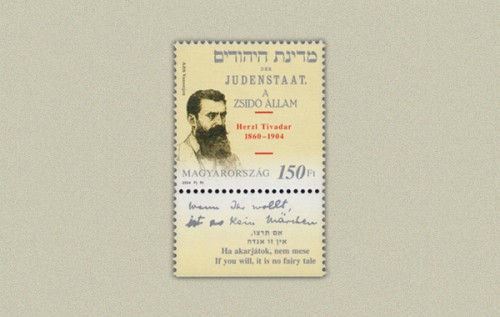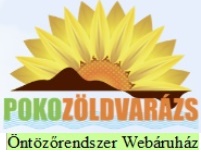
1. MAGYAR - HERZL TIVADAR (1860-1904) - Bélyeg rendelési kód: 2004 év bélyegei kompletten
2. ENGLISH - TIVADAR HERZL (1860-1904) - Order code of the stamp: 2004 Year stamps complete
3. GERMAN - TIVADAR HERZL (1860-1904) - Marke die sprechstunde kode: 2004 Jahr Briefmarken komplett
1. MAGYAR - HERZL TIVADAR - 1860 - 1904
Az Izraeli, az Osztrák és a Magyar Postaigazgatás „Herzl Tivadar”-ra emlékezve közös kiadásban alkalmi bélyeget bocsátott forgalomba.
A politikus és író, a Zsidó Állam megálmodója, Herzl Tivadar 1860. május 2-án született a budapesti Dohány utcában, ahol ma a Zsidó Múzeum és a nagy zsinagóga egyik fő épületszárnya található.
1878-ban családjával Bécsbe költözött, ahol az egyetemen jogot és irodalmat tanult. 1884-ben szerzett jogi doktorátust, de hamarosan elhagyta a jogi pályát, hogy csak szépírással foglalkozzon. Számos írása – cikkek, novellák, regények – nyomtatásban is megjelent. Irodalmi sikereinek köszönhetően 1891-ben párizsi tudósító lett.
Több írását követően 1896-ban jelent meg német nyelven „A Zsidó Állam" című műve, amelyben kifejti cionista programját. Herzl 1897-ben Bázelben hívta össze az első cionista kongresszust, amely elnökévé választotta. Ezt a tisztséget haláláig viselte. 1902-ben tette közzé „Ősújország" című regényét, amely a cionizmus fontos mérföldkövének számít.
1896 és 1904 között bejárta egész Európát, személyes varázsával sok zsidó közösséget és vezetőt meghódított és megnyert elgondolásainak. Uralkodókkal, kormányfőkkel találkozott, megpróbálta meggyőzni őket a zsidó állam szükségességéről. A zsidó-cionista diplomácia első és talán legjelentősebb képviselője volt, az első zsidó az újkorban, aki a világ vezetőivel a zsidó nemzeti kérdésről tárgyalt, és elérte, hogy tárgyalópartnerei komolyan vegyék.
Politikai tevékenysége rendkívüli módon igénybe vette szervezetét, beteg szíve nem bírta azokat a lelki és fizikai megpróbáltatásokat, amelyet a magára vállalt küldetés követelt meg tőle. 1904. június 3-án távozott az élők sorából, végakaratának megfelelően földi maradványait 1950-ben Izraelbe vitték és Jeruzsálemben temették el.
A bélyegképen Herzl Tivadar portréja, valamint művének héber, német és magyar nyelvű címe jelenik meg. A bélyegív alsó ívszélét további feliratok díszítik német, héber, magyar és angol nyelven: „Ha akarjátok, nem mese”. Az izraeli, az osztrák és a magyar postabélyeg együttes bemutatásának céljából reprezentatív kivitelezésű emléklap készült, melyen alkalmi bélyegzéssel szerepelnek az újdonságok. A magyar kibocsátású alkalmi boríték, emléklap és az alkalmi bélyegző grafikáján főmotívumként a Dávid csillag jelenik meg.
Megjelenési időpont: 2004. július 6.
Forrás: Philatelia Hungarica Kft., Magyar Posta
2. ENGLISH - TIVADAR HERZL (1860-1904)
The Hungarian-born Austrian Jewish author Theodor Herzl (1860-1904) founded the World Zionist Organization and served as its first president.
Theodor Herzl, son of Jacob and Jeanette Herzl, was born on May 2, 1860, in Budapest, Hungary, where he attended elementary and secondary schools. In 1878 he was admitted as a law student to the University of Vienna, but after a year of legal studies he switched to journalism. He worked for the Allgemeine Zeitung of Vienna until 1892, when he took an assignment in Paris as correspondent for the Vienna Neue Freie Presse.
In this capacity he reported on the Dreyfus Affair in 1894, and he was greatly troubled by the anti-Semitism he saw in France at the time. In 1896 Herzl started his political career with the publication of his pamphlet The Jewish State: An Attempt at a Modern Solution of the Jewish Question.
According to The Jewish State, persecution could not destroy the Jewish people but would accomplish the opposite: it would strengthen Jewish identification. In Herzl's view, effective assimilation of the Jews would be impossible because of the long history of prejudice and the competition between the non-Jewish and Jewish middle classes. Because of conditions in the Jewish Diaspora, some communities might disintegrate, but the people as a whole would always survive.
Herzl believed that the Jews had little choice but to begin the concentration of the Jewish people in one land under its own sovereign authority. To achieve this purpose, he organized the First Zionist Congress, which met in Basel, Switzerland, in August 1897. This meeting marked the establishment of the World Zionist Organization, whose executives were to be the diplomatic and administrative representatives of the Zionist movement. Herzl became president of the organization, a post he held until his death.
The official goal of the World Zionist Organization was the establishment of "a secured homeland in Palestine for the Jewish people." Because Palestine was part of Turkey and because Germany enjoyed a special relationship with Turkey, in 1898 Herzl met with Kaiser William II in an unsuccessful effort to win his support. In May 1901 Herzl was received by the sultan of Turkey, Abdul-Hamid II. But this meeting too had no positive results, since Turkey was not willing to allow mass immigration without restrictions to Palestine.
In view of the deteriorating situation of eastern European Jewry, Herzl considered other territorial solutions for the Jewish problem. The British government suggested Uganda for the Jewish mass immigration, but this plan was rejected by the Fourth Zionist Congress in 1903, which again stated the ultimate goal of Zionism as the establishment of a Jewish national home in Palestine.
During the Uganda polemics Theodor Herzl showed signs of grave illness. On July 3, 1904, he died and was buried in Vienna. According to his wishes, his remains were transferred by the government of the independent state of Israel to Jerusalem in 1949 and buried on Mt. Herzl, the national cemetery of Israel.
3. GERMAN - TIVADAR HERZL (1860-1904)
Die israelischen, österreichischen und der ungarischen Postverwaltung "Theodor Herzl" zu setzen eine Briefmarke zum Gedenken an die gemeinsame gelegentliche Release auf dem Markt.
Der Politiker und Schriftsteller, vorstellen, den jüdischen Staat, Theodor Herzl 1860. 2. Mai wurde in Budapest, Tabak Street, wo heute das Jüdische Museum und die Große Synagoge ist eines der wichtigsten Flügel geboren.
Im Jahre 1878 zog die Familie nach Wien, wo er studierte Literatur und Jura an der Universität. Im Jahre 1884, Doktor der Rechtswissenschaften, aber bald wieder aufgegeben eine juristische Karriere, die nur szépírással Adresse. Eine Reihe von Schreiben - Texte, Kurzgeschichten, Romane - im Druck erschienen. Literarischer Erfolg im Jahr 1891 dank der lettischen Paris-Korrespondent.
Mehr Schreiben wurde im Jahre 1896 nach der deutschen Sprache "des jüdischen Staates" auf seine Arbeit, die das zionistische Programm erklärt veröffentlicht. Herzl in Basel im Jahre 1897 zog die erste zionistische Kongress, der Präsident gewählt. Diese Position hatte seinen Tod. Im Jahr 1902 veröffentlichte er "Ősújország" Roman, der ein wichtiger Meilenstein im Bereich des Zionismus ist.
Zwischen 1896 und 1904 reiste durch Europa, viel persönlichen Charme und der jüdischen Gemeinde Führer erobert und Ideen gewonnen. Lineale, traf kormányfőkkel versucht, sie von der Notwendigkeit für den jüdischen Staat zu überzeugen. Die jüdisch-zionistischen Diplomatie erste und vielleicht das bekannteste Vertreter war der erste Jude in der Neuzeit, der die Welt Staats-und Regierungschefs in der jüdisch-nationalen Themen werden diskutiert und hat dazu geführt, Unterhändler, ernst genommen zu werden.
Politische Tätigkeit ist in hohem Maße von der Organisation des Herzens des Patienten profitieren können, nicht die geistige und körperliche Leiden, die durch die Mission gebilligt wurde, verlangte sie. 1904. Am 3. Juni verließ er die Menschen in einer Reihe, 's wird im Einklang mit den sterblichen Überreste wurden 1950 nach Israel gebracht und wurde in Jerusalem beerdigt.
Der Stempel Porträt von Theodor Herzl, und seine Werke in Hebräisch, Deutsch und Ungarisch-Titel wird angezeigt. Die bélyegív unteren ívszélét weiter mit Untertitel Deutsch, Hebräisch, Ungarisch und Englisch eingerichtet: "Wenn Sie kein Märchen wollen." Die israelischen, österreichischen und ungarischen Briefmarke mit der Präsentation einer repräsentativen Design für Denkmal-Zertifikat wurde für gelegentliche Stempel in den Medien entwickelt. Die ungarische emittierende gelegentlich Umschlag, Memorial-Zertifikat und die gelegentliche Stempel Grafiken főmotívumként dem Davidstern wird angezeigt.










